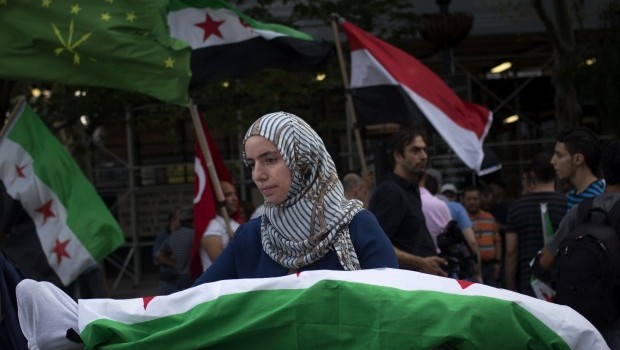
Amina, a Syrian–Canadian, holds a mock corpse covered in Syria’s flag during a protest in front of the United Nations building in New York on August 21, 2013. Several dozen supporters of the Coalition for a Democratic Syria gathered outside the United Nations building on Wednesday to protest against the alleged chemical weapons attack in Damascus. The UN Security Council said it was necessary to clarify an alleged chemical weapons attack in Damascus suburbs on Wednesday but stopped short of demanding a probe by UN investigators currently in Syria. (REUTERS/Adrees Latif)
A statement from the British Foreign Office said: “The UK along with 36 other countries has written to the secretary general formally referring this incident to the UN and calling for the UN team to be granted the necessary access to enable their investigation into these latest allegations as a matter of urgency.”
The team referred to in the statement is a group of UN inspectors who arrived in Syria at the weekend to investigate claims of the use of chemical weapons in the fighting between the government and its armed opponents earlier this year.
French foreign minister Laurent Fabius told reporters that if allegations about the Syrian government’s use of chemical weapons in the latest attack were accurate, it would merit a “reaction with force,” though he ruled out the deployment of French troops in Syria.
The UN Security Council held an emergency meeting on Wednesday after news of the attack in an eastern suburb district of Damascus emerged. Both the government and rebel forces have traded accusations of the use of poison gas, with the rebels claiming that the area was bombarded with artillery rockets armed with poison gas warheads.
According to press reports, the US circulated a draft Security Council resolution that attempted to put extra pressure on the Syrian government to allow the UN team to investigate the area where the attack took place, and called on all sides in Syria to facilitate the team’s work.
However, the measure was reportedly vetoed by Russia and China, and the Security Council instead issued a statement declaring its “concern” at reports of the use of chemical weapons.
Hard evidence for the use of chemical agents in Wednesday’s attack remains thin on the ground. Videos released on the Internet by opposition activists show dozens of bodies, many of which appear to have died in ways which may be consistent with a chemical attack, according to some of the experts consulted about the footage by media organizations.
It is unclear at this stage if the UN’s team, which only entered Syria after lengthy negotiations between UN and Syrian government officials, will be allowed to investigate the latest incident.
Under the terms of its mandate, the team is restricted to investigating three previous incidents. UN deputy secretary-general Jan Eliasson said the Syrian government would have to give its consent to an expansion of its remit, which many see as unlikely.
